|
|
|
Sort Order |
|
|
|
Items / Page
|
|
|
|
|
|
|
| Srl | Item |
| 1 |
ID:
101144
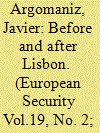

|
|
|
|
|
| Publication |
2010.
|
| Summary/Abstract |
Implementation has often been described as a key weakness affecting European Union (EU) counter-terrorism. However, this view is often adopted as a given and there has not been so far a systematic examination of the degree to which this represents an obstacle to the effectiveness of the EU response. This paper aims to contribute towards this goal through the use of primary sources in the study of the legal transposition of counter-terror instruments into national law, a key stage in the implementation process. It shows the presence of major implementation delays in this policy sector but, importantly, also significant cross-national variation with regards transposition failure associated with the administrative endowment of the individual member states. Furthermore, the mechanisms deployed by the Union to encourage a fluid implementation of European measures are critically evaluated and the potential impact in the process of the institutional transformations brought about by Lisbon is also examined.
|
|
|
|
|
|
|
|
|
|
|
|
|
|
|
|
| 2 |
ID:
128994
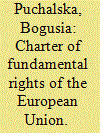

|
|
|
|
|
| Publication |
2014.
|
| Summary/Abstract |
The proclamation of the Charter for Fundamental Rights of the European Union, in December 2000 at Nice, France, followed by its inclusion within the failed Constitutional Treaty and its current status as a legally binding document under the Treaty of Lisbon, charts the changing fortunes of European Union politics dealing with fundamental rights protection. This article outlines the main rationales and hopes behind the enactment of the Charter and notes that through the process of political conditionality it may have been devalued from its very conception. The article suggests that, following their accession, Poland, and later the Czech Republic, used the Charter and Lisbon Treaty negotiations, including their opt-outs from the Charter, to engage in a game of power politics that had both domestic and European undertones. This politics of power game-play reflected a need by both states, and Poland in particular, to respond to both the political conditionality that they had been required to sign up to as part of the accession process and to emphasise how membership had improved their negotiating power. The article suggests that the consequence of this action by both states has not only further devalued the Charter but potentially undermined the rights of Polish and Czech citizens.
|
|
|
|
|
|
|
|
|
|
|
|
|
|
|
|
| 3 |
ID:
160642
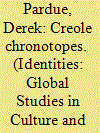

|
|
|
|
|
| Summary/Abstract |
The emergence of Kriolu or Cape Verdean Creole as a black identity should be understood in terms of chronotope, a dynamic iteration that combines time and place in the name of collective identity. The case of Cape Verdean migrants in Lisbon, Portugal, contributes to current debates on blackness as a ‘becoming’ and a complex set of practices by underscoring the role of encounters, both mundane and structural, in racialized formations. I draw from my fieldwork with Cape Verdean rappers and archival research in Lisbon between 2007 and 2013 to suggest that the particularities of Kriolu hold general theoretical lessons on the importance of migrancy and, by extension, space and temporality, in the process of racialization.
|
|
|
|
|
|
|
|
|
|
|
|
|
|
|
|
| 4 |
ID:
120133
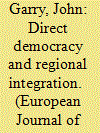

|
|
|
|
|
| Publication |
2013.
|
| Summary/Abstract |
Analyses of voting in European Union referendums typically distinguish between 'second-order' effects and the impact of substantive 'issues'. In order to explain change in referendum outcome, two types of substantive issues are distinguished in this article. Focusing on Irish voting in the Lisbon Treaty referendums and using data from post-referendum surveys, it is found that perceptions of treaty implications outperform underlying attitudes to EU integration in predicting vote choice at both referendums, and perceptions of treaty implications are strong predictors of vote change between the referendums. The findings have broadly positive implications for normative assessments of the usefulness of direct democracy as a tool for legitimising regional integration advance.
|
|
|
|
|
|
|
|
|
|
|
|
|
|
|
|
| 5 |
ID:
096955


|
|
|
|
|
| Publication |
2010.
|
| Summary/Abstract |
The EU as an area of "freedom, security and justice", faces a number of internal security concerns, such as organised crime, terrorism and illegal immigration which require external measures to combat them effectively. Limited progress has been made in the four dimensions of externalisation of EU internal security (the integration of internal security objectives into EU external relations strategy, cooperation with third countries, capacity building in third countries and common action within international organisations) and the EU must continue to expand its capabilities to use external measures to help solve internal security challenges. The Treaty of Lisbon and the 2010-14 Stockholm Programme are both likely to foster further externalisation of EU internal security objectives, but whether this becomes reality will depend to a large degree on the Commission's Action Plan.
|
|
|
|
|
|
|
|
|
|
|
|
|
|
|
|
| 6 |
ID:
100405


|
|
|
|
|
| Publication |
2010.
|
| Summary/Abstract |
We live in extraordinary times - times in which the winds of uncertainty reach our doorstep from anywhere on the planet. Yet our security institutions are anachronistic. On the cusp of the Lisbon Summit, US Ambassador to NATO, Ivo Daalder, describes how, by working together, the Alliance can be refashioned to tackle the security challenges of the twenty-first century.
|
|
|
|
|
|
|
|
|
|
|
|
|
|
|
|
| 7 |
ID:
108378


|
|
|
|
|
| Publication |
2011.
|
| Summary/Abstract |
This article analyses the European Union's (EU) lack of legitimacy for European citizens. It examines the expanding credibility gap of the EU since the Treaty of Lisbon Irish referendums in 2008 and 2009. Although there are various reasons for the EU's lack of legitimacy, this article proposes the failure of the EU to penetrate the domestic public or social spheres and the dearth of opportunities for citizen participation in EU governance as primary factors. The article then considers risks associated with the current euro crisis, drawing lessons from the largely ignored sociological and political factors that impact on its resolution.
|
|
|
|
|
|
|
|
|
|
|
|
|
|
|
|
| 8 |
ID:
102802


|
|
|
|
|
| Publication |
2011.
|
| Summary/Abstract |
WHERE IS NATO going? Recently the question has moved to the center of attention of the analytical, academic and diplomatic communities in Russia and abroad. The Portuguese are as concerned as the rest of the world. Indeed, the disappearance of the Soviet Union left its ideological adversary, the North Atlantic Alliance, a Cold War product, at a crossroads. The NATO-centrism principle cracked under the impact of the multi-polar world which has finally taken shape. In recent years, few sided with the deliberations about NATO as the cornerstone of global security and the "world policeman": this is popular only among certain NATO members still living in the past. The European security and defense policy for each member state, the core of the EU Security Doctrine, envisaged stronger extra-NATO military capabilities. Passions flew high at the numerous scientific-political seminars held in Lisbon on the eve of the NATO summit; some people doubted that the world still needed NATO at all. A sort of "know-how" was required to preserve the accumulated potential and go on living while the member-countries were slashing their military budgets. In 2011, the NATO staff will be trimmed from 13.5 to 9 thousand; 7 command and control structures will replace the present 11. NATO will concentrate at supplies, purchases, maintenance, logistics, communications, and intelligence. The means as well as the aims were in short supply: NATO needed at least a hypothetical or, better still, potential enemy.
|
|
|
|
|
|
|
|
|
|
|
|
|
|
|
|
| 9 |
ID:
096959


|
|
|
|
|
| Publication |
2010.
|
| Summary/Abstract |
Peace and security are a key dimension of the Joint Africa--EU Strategy, adopted at the Lisbon Summit in December 2007. In view of its revision in 2010, a series of shortcomings and some successes can be identified in relation to four main strategic objectives: enhancing the political dialogue on common threats, building a global security partnership, promoting a people-centred approach, ensuring coordination among instruments and resources. In order to make the new peace and security partnership work, the EU is now called upon to address both external and internal challenges: supporting the development of effective African capabilities for the prevention, management and resolution of conflicts, promoting better governance and transparency standards on the continent and establishing a common EU Africa policy.
|
|
|
|
|
|
|
|
|
|
|
|
|
|
|
|
| 10 |
ID:
098975
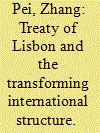

|
|
|
| 11 |
ID:
096346


|
|
|
|
|
|
|
|